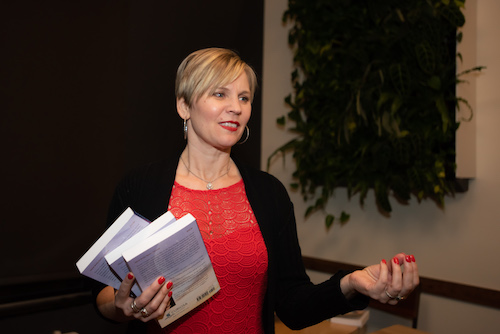One of the most common questions I get asked as an author of a memoir is, “How do you feel, knowing your stories are just out there, for anyone to read or comment on?”
My answer is that it doesn’t bother me one bit.
It’s not because I’m not an intensively private person; I actually am.
It’s not because I’m trying to seek attention, and I don’t care if it’s positive or negative. Trust me on that private person bit.
And it’s not because I just don’t care; I very much do.
It’s not simply a matter of enough time passing, because as we all know, powerful stories from our childhood have a way of putting us right back in a situation as if it’s happening now, while stories from a few days ago passed us by with such a light touch we barely remember them.
It shouldn’t predicate on a kind of follow-the-leader mentality, where we feel pressured to tell our story because others have told similar ones. I can’t help but wonder how many women told their #MeToo stories for this reason, rather than that they were truly ready.
And it’s not even about whether we think it’s a story the public needs to hear.
There are no hard and fast rules to tell us when a story is ready for public consumption. This decision of when to share is more art than science—more feeling than knowing.
Still, if I would say there are a few guidelines we can use to help us determine if a story is ready for the big stage.
(As a sidenote, by sharing stories, I mean clicking publish. But writing our stories down in a journal is itself an incredible healing practice that can lead to a story eventually being ready for sharing. At some point in writing and rewriting, a story will be done with us. Or it won’t. The key is to pay attention, and share accordingly.)
Here are four guidelines to help determine if a story is ready:
1. We’ve done our work on the story.
I don’t simply mean a therapy appointment or two, or chatting about it with friends over wine. I mean really doing the work.
A fully ready story is one from which we’ve digested all its many nutrients—even the ones we don’t like. All the perspectives have been considered. All the various shoes have been walked in. We’ve squeezed as many lessons we possibly could have out of the story, and integrated them into our way of life. Also, we’ve eliminated and let go of those things that we will not integrate, hold, or feel responsible for. In other words, the stories have alchemized us into entirely new beings.
This might sound like an impossible standard to meet, because to some degree, we are never done with our stories (or should we say, they are never done with us). One healer I worked with said that some stories are like gold mines that we can return to again and again in life, and always come away with more gold.
But there comes a point at which things internally shift. Forgiveness has been offered or requested, or in some other way, a true sense of transformation has arisen in us. You know it when you reach it.
2. The story doesn’t nag us.
A story isn’t ready to be told if it is forefront in our psyche, day after day. If everywhere we go and everyone we see is a reminder of the story, then we’re still in the middle of the story—not at the end. This might be an important story to tell someday, but right now it’s too fresh—and too raw—to be told with any kind of perspective.
In fact, at this tender stage in the life cycle of a story, any telling of the story could actually derail our healing and growth, as others chime in with their unprofessional off-the-cuff remarks.
Once a story has done its work with us, it will leave us alone more often than not. That doesn’t mean we don’t retain our memories, but it does mean that we’re not as easily triggered.
A healer once told me that I could consider a story done when I could imagine running into the other person in the story without my heart racing or my palms sweating. In other words, if just the imagining of this kind of encounter sends us into fight-or-flight mode, it’s not ready to share.
3. The story cannot shame us.
There are no stories in my memoir that can shame me anymore. This is actually fascinating to me because there is one story that I remember telling my husband about under the cover of night, in whispered hushes. And there are others that I certainly never imagined would see the light of day, even after I decided to write a memoir. But through the process of working a story on the page, deepening into its meaning and place in my life, I slowly defanged these stories.
So, it doesn’t matter to me whether or not someone judges me harshly, or laughs at my naïveté, or dismisses my entire story as frivolous. I’ve owned my naïveté. A part of me can be frivolous. And no one can possibly judge me harder than I’ve judged myself.
4. The story has shifted from the personal to the universal.
This transference is magical, I have to say, and there’s no amount of will that can make it happen. But as I worked on my stories, and reworked them, I noticed that there came a point where the emotions attached to a story completely left my body and transferred to the page. Emotions are a universal language, and once they make it from our body to the page, the story has officially changed hands.
Once, while reworking a story for which the details had been starkly memorable for me when I began months before, I began to question whether or not the story actually happened. It didn’t feel personal anymore. I had to go back to my journals to remind myself that yes, this really happened.
As weird as this might seem, this is how it feels for me now when I read my stories aloud. They’re not mine anymore, per se. They are just human stories. They are no longer things that happened to me, but offerings I can make to the collective.
There are other stories that didn’t make my memoir, not because they weren’t related to the topic, but because they aren’t done with me yet. They may be available down the line for telling, or they may never be ready in this lifetime. I don’t get to decide that. But I do get to decide to only share what I know I’m sharing with integrity and discernment.
Gift-giving should be done with great care, love, and respect for both the giver and the recipient. Our stories are the finest gifts we could possibly offer to this world. This is why ensuring that they are ready is both a personal responsibility and a deep, universal honor. We should see it and treat it as such.


 Share on bsky
Share on bsky





Read 18 comments and reply